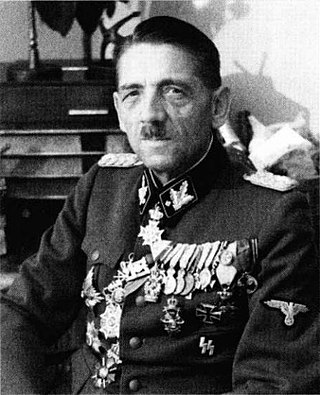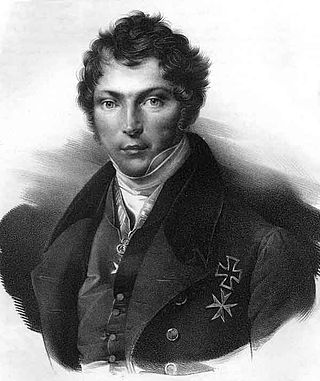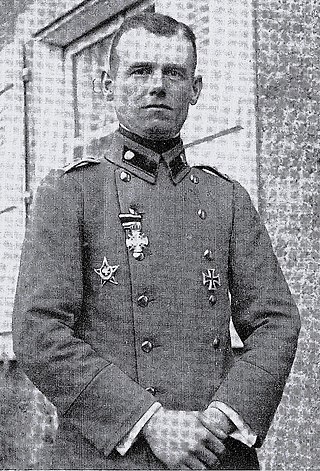Related Research Articles

The Battle of Abensberg took place on 20 April 1809 between a Franco-German force under the command of Emperor Napoleon I of France and a reinforced Austrian corps led by Feldmarschall-Leutnant Archduke Louis of Austria. As the day wore on, Feldmarschall-Leutnant Johann von Hiller arrived with reinforcements to take command of the three corps that formed the Austrian left wing. The action ended in a complete Franco-German victory. The battlefield was southeast of Abensberg and included clashes at Offenstetten, Biburg-Siegenburg, Rohr in Niederbayern, and Rottenburg an der Laaber. On the same day, the French garrison of Regensburg capitulated.

Joachim von Rohr was a lieutenant colonel for the Swedish Empire and Commandant of the Dalarö fortress. He participated in the Battle of Poltava and was captured and held as a prisoner of war in Solikamsk in Russia.

Anders Örbom was a captain in the Swedish Army who was at the Surrender at Perevolochna and taken to Siberia as a prisoner of war for 13 years.

Artur Gustav Martin Phleps was an Austro-Hungarian, Romanian and German army officer who held the rank of SS-Obergruppenführer und General der Waffen-SS in the Waffen-SS during World War II. At the post-war Nuremberg trials, the Waffen-SS – of which Phleps was a senior officer – was declared to be a criminal organisation due to its major involvement in war crimes and crimes against humanity. An Austro-Hungarian Army officer before and during World War I, Phleps specialised in mountain warfare and logistics, and had been promoted to Oberstleutnant by the end of the war. During the interwar period he joined the Romanian Army, reaching the rank of General-locotenent, and also became an adviser to King Carol. After he spoke out against the government, he asked to be dismissed from the army after being sidelined.

Alexander Mikhailovich Rimsky-Korsakov was a Russian general remembered as an unlucky assistant to Alexander Suvorov during his Swiss expedition of 1799–1800.

The 715th Infantry Division was a German infantry division which fought during World War II.

Franz Freiherr Rohr von Denta was an Austro-Hungarian field marshal and field commander who served as the last commander of the Austro-Hungarian First Army.

Kurd Wolfgang Wilhelm Gustav von Schöning was a Prussian major general and historian of the army.

Gustav Viktor Josef Globočnik Edler von Vojka was an Austrian soldier and nobleman. He achieved rank of lieutenant field-marshal (Feldmarschalleutnant) in the Austro-Hungarian Army.

Schloss Tamsel is a significant historical estate in the Brandenburg Neumark region. The estate is located in what is today the small village of Dąbroszyn, Poland, and consists of a manor house, a church and a park. It was constructed in the late 17th century by Field Marshal Hans Adam von Schöning. His granddaughter, Luise Eleonore, inherited the castle as a child of four and married Lieutenant-General von Wreech at age 16.

Joachim Cronman was an owner of estates in Livonia and a colonel for the Swedish Empire. He was the Commandant of the Neumünde redoubt/fortlet.

The siege of Stralsund lasted from 24 July to 24 August, 1807, and saw troops from the First French Empire twice attempt to capture the port city from Lieutenant General Hans Henric von Essen's 15,000-man Swedish garrison. Early that year, Marshal Édouard Adolphe Casimir Joseph Mortier blockaded the city for two months before he was called elsewhere. In his absence, the Swedes drove back the inferior blockading force. After Mortier returned and pushed Essen's troops back in turn, the two sides quickly concluded an armistice. The truce was later repudiated by King Gustav IV Adolf of Sweden, and Marshal Guillaume Marie Anne Brune then led 40,000 French, German, Spanish, Italian and Dutch soldiers against the fortress. Fearfully outnumbered, the Swedes abandoned the Baltic Sea port of Stralsund to the Franco-Allies in the action during the War of the Fourth Coalition, part of the Napoleonic Wars. As a consequence, Sweden also lost the nearby island of Rügen.

Willy Martin Ernst Rohr was a German Army officer who was a major contributor to the development of infantry tactics in World War I, particularly for the system of Storm Battalions.
Friedrich Wilhelm Ferdinand Ernst Heinrich von Forcade de Biaix, aka Ferdinand von Forcade, Royal Prussian Major and Knight of the Iron Cross 2nd Class.

Prince Frederick Henry Charles of Prussia was a Prussian prince and army officer.

Arnold Christoph von Waldow (1672–1734) was Lord of the Manor on Hammer and Költschen, Lieutenant General, Governor of Breslau and Knight of the Black Eagle. Born on 15 April 1672 in Stolzenfelde, Neumark, he was the son of the Brandenburg Captain Christian Sigismund von Waldow (1650–1707) and Katharina von Sydow (1651–1702). His brother Friedrich Siegmund von Waldow (1682–1743) was a Prussian general.

Johann Dietrich von Hülsen was a Prussian lieutenant general of the infantry. After a lifelong officer's career in various infantry regiments, he acquired the special respect of Frederick II in the Seven Years' War as general, and was honored by him with the appointment as governor of Berlin. During the war, he became a canon to Minden and was awarded the Black Eagle Order and the Order Pour le Mérite. His name appears on the top tier of the Equestrian statue of Frederick the Great.

Peter Ernst von Pennavaire was the son of a French advocate (attorney) in Toulouse who fled France in about 1685. He served in the Prussian army, achieving the rank of lieutenant general of cavalry and proprietor of the Leib-Carabiniers. He was the recipient of the Black Eagle Order and Pour le Mérite. At age 80, he led his cavalry in a charge at the Battle of Breslau at the Austrian front, and died of complications from injuries he received there.

Assault Battalion No. 5 (Rohr), was an experimental infantry battalion of the Imperial German Army during World War I. Under command of its namesake, Hauptmann Willy Rohr, It was known its innovative infantry tactics as part of the German High Command's attempt to break the stalemate of trench warfare. The battalion began as a combat engineer detachment of the 8th Army Corps, but was later expanded to a battalion and became one of Kaiser Wilhelm's favorite units.
General Sir George Pigot, 3rd Baronet (1766–1840) was a British Army officer. The son of Lieutenant-General Sir Robert Pigot, 2nd Baronet he served in the 38th Regiment of Foot, 1st (Royal) Regiment of Foot and the Independent Companies before being asked to recruit his own unit, the 130th Regiment of Foot, in 1794. Pigot was granted command of the unit, as lieutenant-colonel, in 1795. It served in the West Indies where it was almost wiped out by disease and disbanded in 1796. Pigot inherited the baronetcy in 1796 and was appointed deputy lieutenant of the Staffordshire Militia in 1797. He was reappointed to the army in 1800 and was promoted to major-general in 1812 and to general in 1825.
References
 This article incorporates text from this source, which is in the public domain :Schöning, Kurd Wolfgang von (1840), Die Generale der chur-brandenburgischen und königlich preussischen Armee von 1640-1840: eine historische Uebersicht, sammt vielen eingewebten urkundlichen Notizen : als Jubelschrift dem vaterländischen Kriegesheere geweiht (in German), C.G. Lüderitz, p. 265
This article incorporates text from this source, which is in the public domain :Schöning, Kurd Wolfgang von (1840), Die Generale der chur-brandenburgischen und königlich preussischen Armee von 1640-1840: eine historische Uebersicht, sammt vielen eingewebten urkundlichen Notizen : als Jubelschrift dem vaterländischen Kriegesheere geweiht (in German), C.G. Lüderitz, p. 265